Unit 5 Wild animals Grammar 课件(共21张PPT)
文档属性
| 名称 | Unit 5 Wild animals Grammar 课件(共21张PPT) |

|
|
| 格式 | pptx | ||
| 文件大小 | 5.9MB | ||
| 资源类型 | 教案 | ||
| 版本资源 | 牛津译林版 | ||
| 科目 | 英语 | ||
| 更新时间 | 2023-11-20 08:26:22 | ||
图片预览

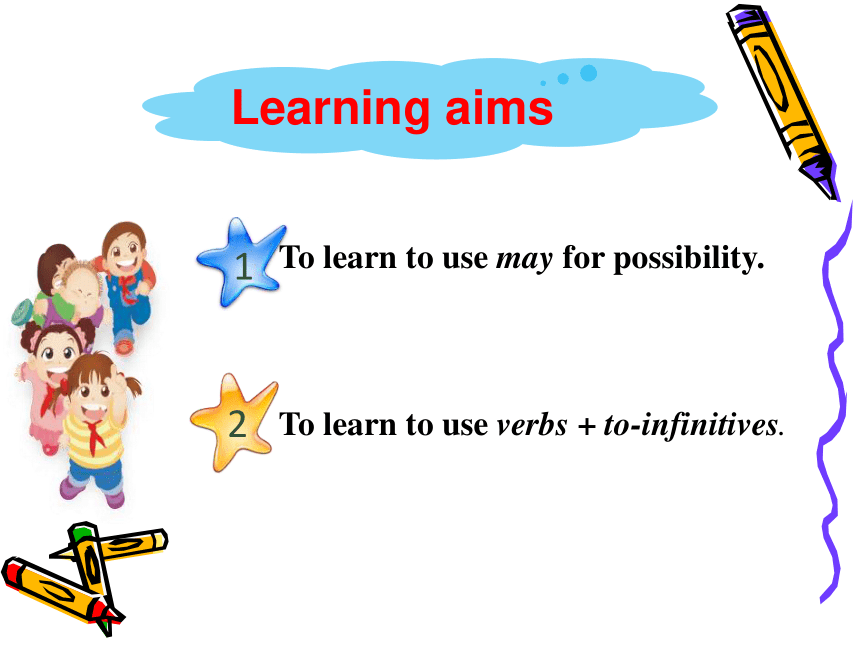
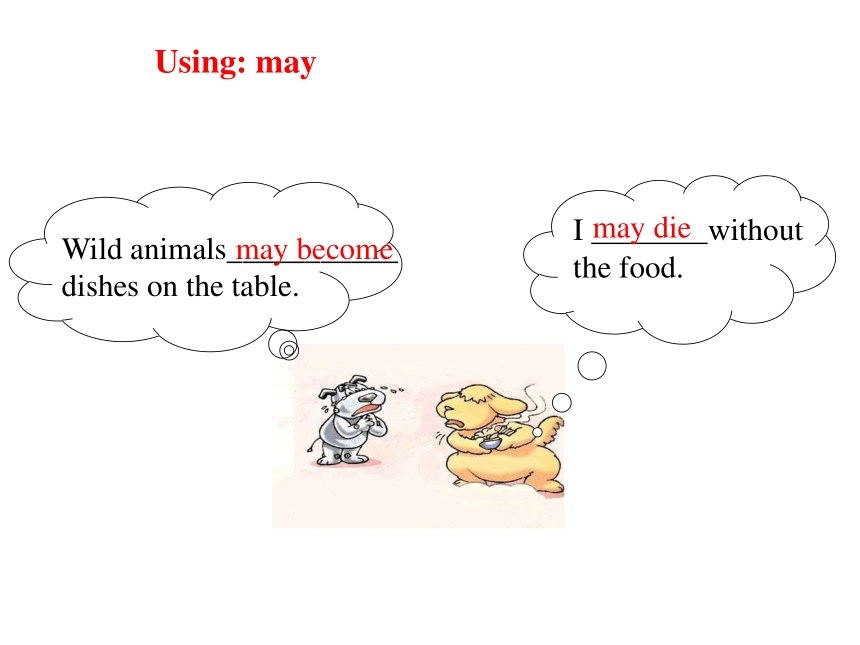
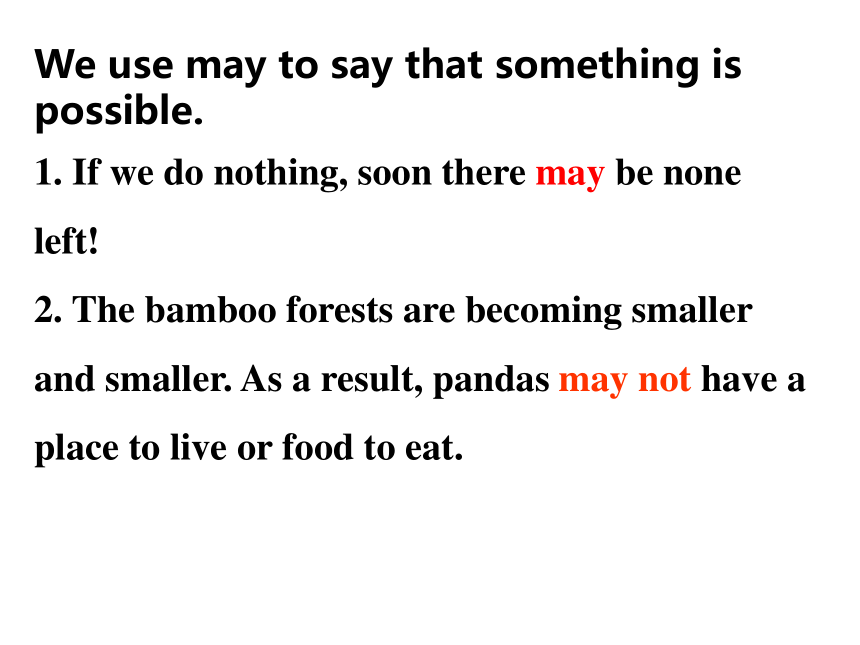

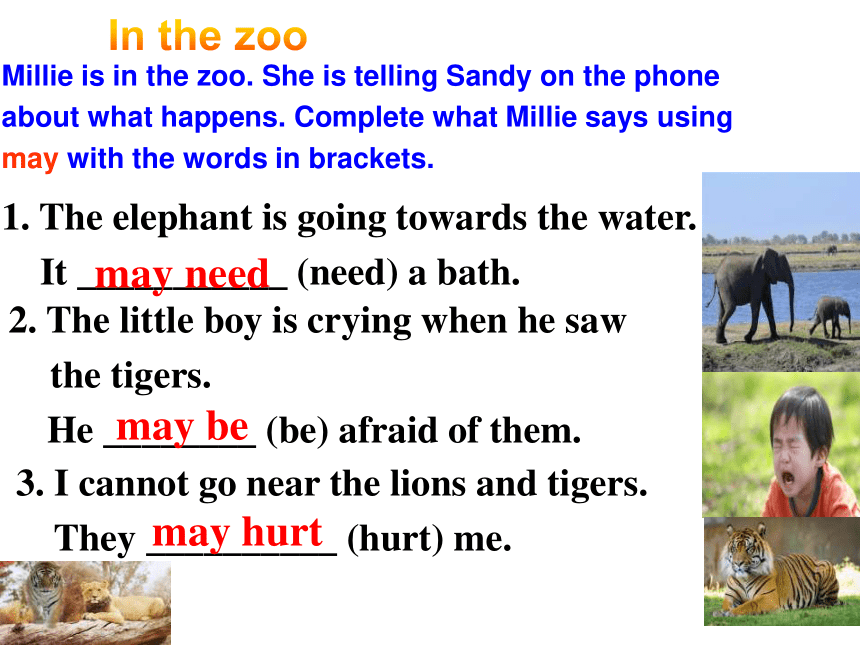
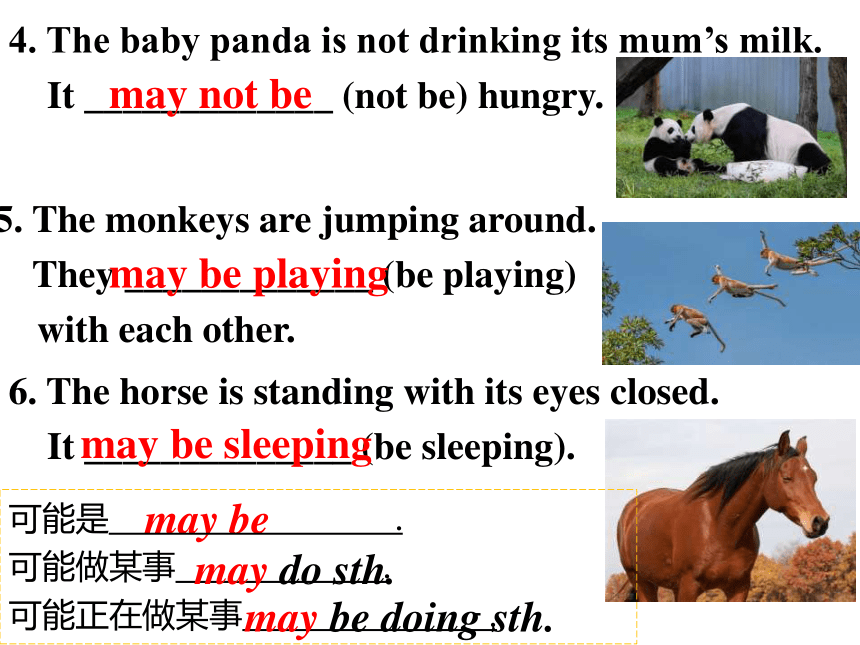
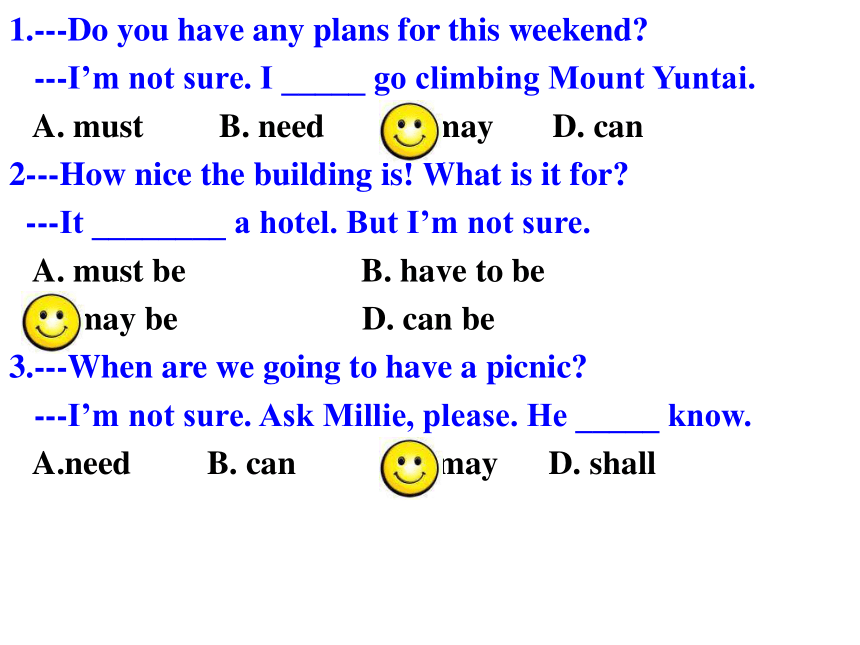
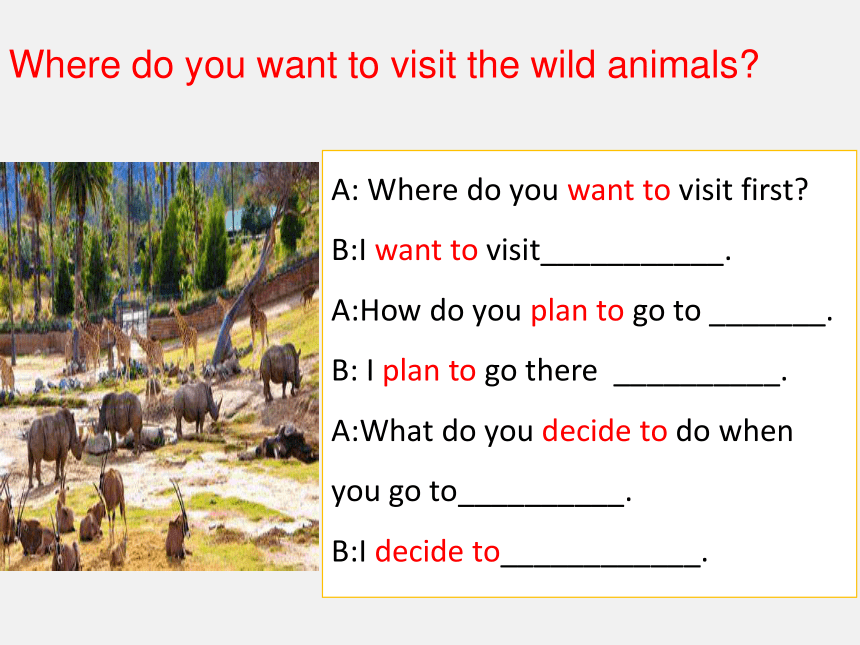
文档简介
(共21张PPT)
Unit 5 Wild animals
Grammar
1
2
To learn to use may for possibility.
To learn to use verbs + to-infinitives.
Learning aims
I without the food.
Wild animals___________ dishes on the table.
may become
may die
Using: may
We use may to say that something is possible.
1. If we do nothing, soon there may be none left!
2. The bamboo forests are becoming smaller and smaller. As a result, pandas may not have a place to live or food to eat.
1.may表猜测,只能用于肯定句与否定句中,疑问句中表示推测可能用can;
例:They may go to the natural reserve next month.
Can this book be hers
2.may表示推测可以与副词possibly / perhaps /maybe进行转换,注意时态;
例They may go to the natural reserve next month.
=Maybe they will go to the natural reserve next month.
其他表示猜测:一定 可能
不可能
must
can’t
can
In the zoo
Millie is in the zoo. She is telling Sandy on the phone about what plete what Millie says using may with the words in brackets.
1. The elephant is going towards the water.
It ___________ (need) a bath.
may need
2. The little boy is crying when he saw the tigers.
He ________ (be) afraid of them.
may be
3. I cannot go near the lions and tigers.
They __________ (hurt) me.
may hurt
4. The baby panda is not drinking its mum’s milk.
It _____________ (not be) hungry.
may not be
5. The monkeys are jumping around.
They _____________ (be playing) with each other.
may be playing
6. The horse is standing with its eyes closed.
It ______________ (be sleeping).
may be sleeping
may be
可能是 .
可能做某事 .
可能正在做某事 .
may be doing sth.
may do sth.
1.---Do you have any plans for this weekend
---I’m not sure. I _____ go climbing Mount Yuntai.
A. must B. need C. may D. can
2---How nice the building is! What is it for
---It ________ a hotel. But I’m not sure.
A. must be B. have to be
C. may be D. can be
3.---When are we going to have a picnic
---I’m not sure. Ask Millie, please. He _____ know.
A.need B. can C. may D. shall
A: Where do you want to visit first
B:I want to visit___________.
A:How do you plan to go to _______.
B: I plan to go there __________.
A:What do you decide to do when you go to__________.
B:I decide to____________.
Where do you want to visit the wild animals
When she was 20 months old, she learnt to look after herself.
Using verbs + to-infinitives
Verbs+(not) to do
动词+动词不定式
当句子中已经有谓语动词,而我们又要表达不止一个动作概念时,其余的动词可以使用非谓语形式表达,动词不定式就是动词的一种非谓语形式,其基本形式是“to+动词原形”
Example:
At four years old, she decided to go outside for the first time.
When she was six month old, she began to eat bamboo.
不定式有 to do 和 do,
多数加 to do 少数加 do,
下列动词后省去 to ,
“三看”“两听” “一感觉”,
外加三个“小使役”,
保你永远不忘记!
see, watch, look at
hear , listen to
feel
let, make , have
We often use to-infinitives after these verbs.
agree choose decide hope
learn plan prepare want
like start begin fail
wish try remember forget
Try to find “verb+to-infinitives” in the passage.
Last month, Nick visited Uncle Wang in the country with
his parents. At first, his father planned to drive his car there.
However, the traffic was so busy that they decided to take a
bus there. Uncle Wang has a big farm, and there are many
apple trees in it. Nick couldn't wait to get there to help Uncle
Wang pick apples.
In the farm he tried to pick the apples in a tall tree, but he
wasn’t tall enough and failed to reach one. Two hours later,
he felt thirsty and stopped to choose a big and red apple.
He was just beginning to eat it when his mother said to him,
“Remember to wash it before eating. You should learn to form
a good habit of cleaning fruits before eating them.”
Dad: Do you know anything special about wild animals
Amy: Yes, Dad. For example, dolphins are clever. They
can _________________ (learn, work out) easy
Maths problems.
Dad: What do you know about bats
Amy: Bats can’t see, but they never ____________(fail, fly)
the right way with the help of their mouth and ears.
Dad: Did you know that bees never get lost
Amy: Yes. Bees always_________________________
(remember, come back) the same way as they go.
Dad: What do you know about squirrels
Amy: They always ______________ (begin, save) some food
before winter comes.
Dad: Yes, but sometimes they forget where to find the food.
learn to work out
fail to fly
remember to come back
begin to save
Exercises
remember to do sth. 记得去做某事
remember doing sth. 记得做过某事
区别
forget to do sth. 忘记去做某事
forget doing sth. 忘记做过某事
e.g.
Tom, 记得课后和我们一起打篮球。
Tom, remember to play basketball with us after class.
我记得上个月写了一封信给你。
I remembered writing a letter to you last month.
stop to do sth. 停下(正在做的)事去做
(另一件)事
stop doing sth. 停止做(正在做的)事
e.g. 让我们停下来休息一下。
Let’s stop to have a rest.
不要说话, 老师来了。
Stop talking. The teacher is coming.
区别
1.They are preparing __________(have) a sports meeting.
2.Jim agreed __________(go) to the West Lake.
3.It’s easy ____________(play) softball.
4. What made you_______ (feel) sad
5.Mr White learned _________(ride) a horse last year.
6. We will try our best __________(read) more books.
7. Let’s ________(share) our joys together.
8. I don’t know where___________(visit ) next year
9.Max wondered how___________(start) a campfire.
10. Are you ready___________(drive) me home
11. Last week, we chose _______ (visit) Tianmuhu to enjoy ourselves.
to have
to go
to play
feel
to ride
to read
share
to visit
to start
to drive
Practice
to visit
1. 他可能认识你。
He _________ you.
2. 他们可能下周去长城。
They _________ the Great Wall next week.
3. 我们同意马上离开。
We agreed ________ at once.
4. Laura计划到中国一些名胜之地旅游。
Laura ____________ some places of
interest in China.
5. 你愿意和他一起工作吗?
Would you _____________ with him
like to work
plans to visit
to leave
may know
may go to
完成句子。
Homework
1. Make more sentences with may and verbs + to-infinitives.
2. Finish the exercises in the workbook.
That’s all !
Unit 5 Wild animals
Grammar
1
2
To learn to use may for possibility.
To learn to use verbs + to-infinitives.
Learning aims
I without the food.
Wild animals___________ dishes on the table.
may become
may die
Using: may
We use may to say that something is possible.
1. If we do nothing, soon there may be none left!
2. The bamboo forests are becoming smaller and smaller. As a result, pandas may not have a place to live or food to eat.
1.may表猜测,只能用于肯定句与否定句中,疑问句中表示推测可能用can;
例:They may go to the natural reserve next month.
Can this book be hers
2.may表示推测可以与副词possibly / perhaps /maybe进行转换,注意时态;
例They may go to the natural reserve next month.
=Maybe they will go to the natural reserve next month.
其他表示猜测:一定 可能
不可能
must
can’t
can
In the zoo
Millie is in the zoo. She is telling Sandy on the phone about what plete what Millie says using may with the words in brackets.
1. The elephant is going towards the water.
It ___________ (need) a bath.
may need
2. The little boy is crying when he saw the tigers.
He ________ (be) afraid of them.
may be
3. I cannot go near the lions and tigers.
They __________ (hurt) me.
may hurt
4. The baby panda is not drinking its mum’s milk.
It _____________ (not be) hungry.
may not be
5. The monkeys are jumping around.
They _____________ (be playing) with each other.
may be playing
6. The horse is standing with its eyes closed.
It ______________ (be sleeping).
may be sleeping
may be
可能是 .
可能做某事 .
可能正在做某事 .
may be doing sth.
may do sth.
1.---Do you have any plans for this weekend
---I’m not sure. I _____ go climbing Mount Yuntai.
A. must B. need C. may D. can
2---How nice the building is! What is it for
---It ________ a hotel. But I’m not sure.
A. must be B. have to be
C. may be D. can be
3.---When are we going to have a picnic
---I’m not sure. Ask Millie, please. He _____ know.
A.need B. can C. may D. shall
A: Where do you want to visit first
B:I want to visit___________.
A:How do you plan to go to _______.
B: I plan to go there __________.
A:What do you decide to do when you go to__________.
B:I decide to____________.
Where do you want to visit the wild animals
When she was 20 months old, she learnt to look after herself.
Using verbs + to-infinitives
Verbs+(not) to do
动词+动词不定式
当句子中已经有谓语动词,而我们又要表达不止一个动作概念时,其余的动词可以使用非谓语形式表达,动词不定式就是动词的一种非谓语形式,其基本形式是“to+动词原形”
Example:
At four years old, she decided to go outside for the first time.
When she was six month old, she began to eat bamboo.
不定式有 to do 和 do,
多数加 to do 少数加 do,
下列动词后省去 to ,
“三看”“两听” “一感觉”,
外加三个“小使役”,
保你永远不忘记!
see, watch, look at
hear , listen to
feel
let, make , have
We often use to-infinitives after these verbs.
agree choose decide hope
learn plan prepare want
like start begin fail
wish try remember forget
Try to find “verb+to-infinitives” in the passage.
Last month, Nick visited Uncle Wang in the country with
his parents. At first, his father planned to drive his car there.
However, the traffic was so busy that they decided to take a
bus there. Uncle Wang has a big farm, and there are many
apple trees in it. Nick couldn't wait to get there to help Uncle
Wang pick apples.
In the farm he tried to pick the apples in a tall tree, but he
wasn’t tall enough and failed to reach one. Two hours later,
he felt thirsty and stopped to choose a big and red apple.
He was just beginning to eat it when his mother said to him,
“Remember to wash it before eating. You should learn to form
a good habit of cleaning fruits before eating them.”
Dad: Do you know anything special about wild animals
Amy: Yes, Dad. For example, dolphins are clever. They
can _________________ (learn, work out) easy
Maths problems.
Dad: What do you know about bats
Amy: Bats can’t see, but they never ____________(fail, fly)
the right way with the help of their mouth and ears.
Dad: Did you know that bees never get lost
Amy: Yes. Bees always_________________________
(remember, come back) the same way as they go.
Dad: What do you know about squirrels
Amy: They always ______________ (begin, save) some food
before winter comes.
Dad: Yes, but sometimes they forget where to find the food.
learn to work out
fail to fly
remember to come back
begin to save
Exercises
remember to do sth. 记得去做某事
remember doing sth. 记得做过某事
区别
forget to do sth. 忘记去做某事
forget doing sth. 忘记做过某事
e.g.
Tom, 记得课后和我们一起打篮球。
Tom, remember to play basketball with us after class.
我记得上个月写了一封信给你。
I remembered writing a letter to you last month.
stop to do sth. 停下(正在做的)事去做
(另一件)事
stop doing sth. 停止做(正在做的)事
e.g. 让我们停下来休息一下。
Let’s stop to have a rest.
不要说话, 老师来了。
Stop talking. The teacher is coming.
区别
1.They are preparing __________(have) a sports meeting.
2.Jim agreed __________(go) to the West Lake.
3.It’s easy ____________(play) softball.
4. What made you_______ (feel) sad
5.Mr White learned _________(ride) a horse last year.
6. We will try our best __________(read) more books.
7. Let’s ________(share) our joys together.
8. I don’t know where___________(visit ) next year
9.Max wondered how___________(start) a campfire.
10. Are you ready___________(drive) me home
11. Last week, we chose _______ (visit) Tianmuhu to enjoy ourselves.
to have
to go
to play
feel
to ride
to read
share
to visit
to start
to drive
Practice
to visit
1. 他可能认识你。
He _________ you.
2. 他们可能下周去长城。
They _________ the Great Wall next week.
3. 我们同意马上离开。
We agreed ________ at once.
4. Laura计划到中国一些名胜之地旅游。
Laura ____________ some places of
interest in China.
5. 你愿意和他一起工作吗?
Would you _____________ with him
like to work
plans to visit
to leave
may know
may go to
完成句子。
Homework
1. Make more sentences with may and verbs + to-infinitives.
2. Finish the exercises in the workbook.
That’s all !
